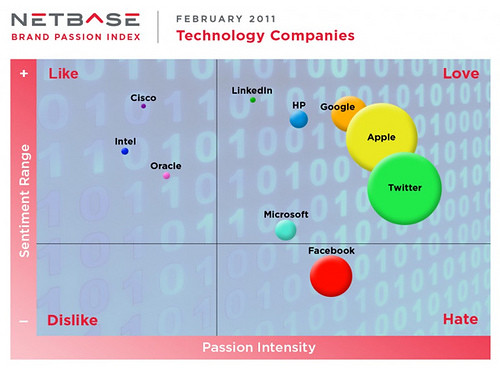Z Cloud
The final piece of Zynga’s Z Cloud revealed — Cloud Computing News – Zynga is a gaming company with the action being online rather than in the client device hence the need for Z Cloud computing platform. Z Cloud would facilitate player accounts, the sale of virtual goods and real time game play for tens of millions of game users. Given this requirement Z Cloud must be secure in nature and have extensive computing, storage and network assets.
Beauty
Chinese Cosmetic Brand BYKL Goes Traditional To Take On European Rivals « Jing Daily – surprised more Chinese luxury brands aren’t playing to strengths like this
China
A Chinese Perspective: Why Foreign Companies Fail, and How To Succeed In China | Tech in Asia
Consumer behaviour
It’s Not Me, It’s You: Consumers Breaking Up With Brands
Guitar Zero: A Neuroscientist Debunks the Myth of “Music Instinct” | Brain Pickings
Wooing the Promiscuous Chinese Consumer – Harvard Business Review
How the Next Generation Consumes Online Health (comScore Voices)
Economics
Europe can learn from Japan’s austerity endgame – FT.com – take a more Keynesian line
UK, France may lose top Moody’s rating – not terribly surprised, the increased VAT likely affected government income and the UK is inextricably linked to the EU by trade
Finance
AIG’s Benmosche: Wall Street Doesn’t Own, It Rents – WSJ – if you don’t read any other financial news this week, read Robert Benmosche’s quote
Germany
In wake of online protests, Germany refuses to sign the ACTA anti-piracy treaty | VentureBeat
Innovation
Nike Introduces Flyknit Technology | NEW YORK – TOKYO – made out of a single polyester thread woven to a shoe
How best to reduce power on future ICs – really nice article by Junko Yoshida at the EETimes
Report: CMOS in, CCD out of image focus
EU Competition Chief: Don’t Mess With Standards Essential Patents – AllThingsD
ACTA is Useless… and a Threat, Says Ex-EU Lead Negotiator – WSJ
Elpida is uncertain about its future – The Inquirer
BBC News – BAE provides details of ‘structural battery’ technology
Japan
Luxury
Why Chinese Luxury Consumers Prefer to Shop Overseas | The China Observer
Savvy Chinese consumer comes of age – FT.com – want real rather than fake
China Online Luxury Market Surpasses 10 Billion Yuan For First Time « Jing Daily
Chinese Tourists Big Spenders At Singapore Airport « Jing Daily
Media
Kenny Rogers knows when to hold ’em…and sue EMI | CNET News
US Begins Process Of Forcing Extreme IP Enforcement Across Africa | Techdirt
FT and UBM built environment titles release own ‘audience’ figures | Press Gazette
The Dutch Look To Legalize Mashups | Motherboard
Piracy, the Grammys, and Why We Need to Break Up with the Entertainment Industry | Motherboard
BitTorrent piracy has no impact on U.S. box office sales, study finds
The Economist says the future of media’s in tablet form | Sub:stantial
Online
As Sure As Night Follows Day, Tencent Launches a Pinterest Clone | Tech in Asia
TelecomTV | Pride and Prejudice: Facebook’s censorship rules laid bare for all to see
Bing to embarrass: Feature lets you link Facebook friends to search results | VentureBeat – google bombing for 21st century?
Flickr Is Getting a Major Makeover | Betabeat – not sure how I feel about the view, likely to be resource hungry?
Be aware and beware Facebook rules — you could lose valuable rights | ZDNet – this could radically affect below the line tactics on Facebook
UK Minister says website blocking proposals “imminent” – welcome to a digital merchantile environment rather than a global economy
Groklaw – In Defense of Anonymous Speech ~pj – or why Facebook is wrong
Yahoo’s Talks to Sell Asian Assets Fall Apart | Business | TIME.com
CultureLab: The dark side of the personalised internet
Retailing
F-Commerce provides more proof that online traffic != customers | Excapite
Amazon planning first real-world shop: report ‹ Japan Today – potential interesting move by Amazon – kind of reverse showrooming
How Google Apps May Soon Let Salespeople Stalk You
Monocolumn – Unexpected item in bagging area [Monocle]
Online Retail Attracts Highest Number of Europeans to Date
Rise of ‘F-commerce’: Reckitt Benckiser sells new Cillit Bang product solely via Facebook (Digital Knowledge Centre – Digital Intelligence) – what is the social context that would make consumers want to buy things from Cillit Bang on Facebook?
Amazon Is Said to Have Fewer Prime Members Than Estimated – Bloomberg
Security
Wi-Fi Passpoint standard could end hotspot sign-on hassles
Going to China? Look at the anti-hacking precautions the pros take before traveling | The Verge – smart list that enhance information security in general
NoobProof firewall configuration tool
Software
China’s Shanda Unveils Smartphone Operating System – ChinaTechNews.com
An Exodus to iOS Awaits Android Market Collapse | SiliconANGLE
Windows Phone Facebook numbers hint at less than stellar progress | guardian.co.uk
HP rolls out more open webOS components, new Isis browser and some organization — Engadget
Epic’s Tim Sweeney predicts the next 20 years in gaming technology | VentureBeat – interesting take on gaming and reality from a technological standpoint
Download bots were the “well-known secret” of the app ecosystem
Technology
Apple finally talks, says Proview refuses to honor agreement to transfer iPad trademark | 9to5Mac
Google has intriguing plans at the Googleplex – San Jose Mercury News – points to more hardware products and customer group / partner targets
Semiconductor blues: Samsung may sell LCD business, Elpida faces uncertainty | ExtremeTech
When Will Apple Peak? – some interesting charts pulled together by ReadWriteWeb
U.S. Consumer Electronics Sales Reach $144 Billion in 2011 | NPD – down 1 per cent year on year
Smartphones and Tablets Fuel the Rise of the Digital Omnivore
Analyst ranks chip markets by 2012 growth prediction – surprised the DSPs (digital signal processors) are declining as much as these numbers suggest
Telecoms
MIIT Says Telecom Growth Outpaced GDP Growth Last Year | Tech in Asia – in China
Light Reading – Metcalfe to Unveil ‘New Ethernet’
Cisco: mobile connections will hit 10 billion by 2016, helped by tablet boom — Engadget
Vietnam
Taking Vietnam’s economy to the next level – McKinsey Quarterly
Web of no web
Hands-on with Immersion HD Integrator hi-fi haptics — Engadget
Remember ‘If Microsoft made cars…’ jokes? – great piece on poor user experience in car design
Wireless
Qualcomm just announced the chip that would be a one-stop shop for Apple’s mobile needs | 9to5Mac
ISSCC: Intel focuses on low power, digital RF
Communities Dominate Brands: This is Delusion – Nokia CEO Elop today in interview
Google: 46% of Holiday Shoppers Used Smartphone for Research Before Buying Offline | Internet2Go – shows importance of multi-channel marketing
MediaTek moves upmarket with Android/HSPA chip – Rethink Wireless
TI packs seven radios into one chip – Rethink Wireless
Proposal for E.U. Roaming Fees Includes Global Cap – NYTimes.com

